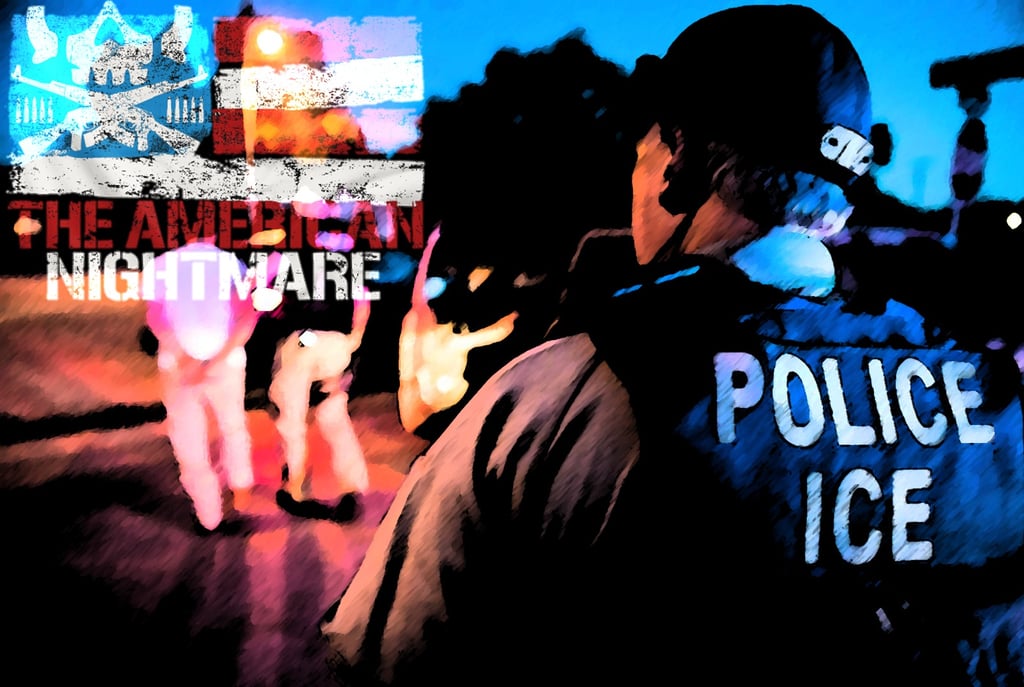The American Nightmare
The sun-drenched promise of opportunity curdles into a pervasive, pulsating paranoia, where every shadow stretches like a watchful eye, and silence hums with unseen surveillance. This isn't the land of the free, but a gilded cage where precarity is the air you breathe, and the chilling lyrics of Rockwell's "Somebody's Watching Me" become a terrifying, daily liturgy.
HORRORDARKPSYCHOLOGICALTHRILLER/SUSPENSESPECULATIVESUPERNATURAL
TL Hutton
10/8/202512 min read


A pewter-yellow orb of pagan rage, the Sonoran Desert sun glared down on the cracked windshield of Mateo’s ’78 Ford F-150. Each mile marker along the I-10 West was a countdown—not to the salvation of his familia and home, but to a potential confrontation he wasn’t sure he could win. Built upon the dirty desert grit and secrets long lost to the modern world, Tucson blurred past beyond the old Ford’s dust-filmed windows. Forever watching over the ancestral lands of the Hohokam and Piman people, Sentinel Peak loomed over the steel-and-concrete sprawl of strip malls, barrios of stucco boxes, and asphalt arteries connecting it all. Even those brilliant murals of downtown–Pagac's Saguaro, Los Tres Amigos, The Desert Colossus, and Sonoran Skylines—usually a celebratory eruption of color during his daily commutes, seemed muted as he passed, tainted by the oppressive heat and dread that coiled in his stomach with each passing day.
Mateo was as American as apple pie—if apple pie was flavored with chiles and cilantro instead of brown sugar and cinnamon. A native Tucsonan by birth, the Sonoran sun had baked him a deep sienna, laughter and worry long ago etching shallow furrows around his warm, brown eyes. Streaked with premature gray at the temples, his onyx hair framed a face that silently spoke of quiet strength and resilience while his wiry build held the hard-earned muscles of years spent working construction under the unforgiving Sonoran sun.
But lately, that strength felt fleeting. Horror plagued the news: ICE raids were tearing families apart across the country, there were whispers of deportations without due process, of courtrooms being turned into hunting grounds to rival those of Torquemada’s Inquisition. A gnawing unease had long ago settled in his bones; a frigid, unsettling prickling at the back of his neck, like scorpions skittering out of a desert grave, whenever he saw the white SUVs. They seemed to materialize out of the desert haze like fucking cockroaches—suddenly lurking outside the Home Depot where he bought his supplies, idling in the shadows near the Mercado de la calle Almeda where his wife, Elana, haggled for fresh produce, cruising slowly through Barrio El Hoyo and past their small stucco casita. It wasn’t just him, Mateo noticed, who had become unsettled at their appearances. It was heard in each hushed conversation at the mercado, the frantic calls back home, witnessed in the fear shrouding the eyes of his neighbors, in the fleeting glimpses of white SUVs lurking on the edges of Barrio El Hoyo, slithering like ghostly serpents through the dusty side streets. Their presence had diminished the once bright-eyed hope of his hard-working friends and neighbors, replacing it with a communal cloak of fear. The laughter that filled the streets only weeks prior, the colorful celebrations of life at weekend fiestas de barrio, a friendly “Buenos Dias” during a stop at the Circle K for fuel and a morning café before work, all silenced, subdued into nervous glances over shoulders that were the new social norm.
Mateo drummed his fingers on the cracked dashboard, the late afternoon sun glinting off the dust motes dancing in the cab, his thumb hovering hesitantly over the old Pioneer radio's SCAN button—it always begins with the radio, cabrón. Don’t do it…
Fuck! Fuck! Fuck! That little voice in his head was always right! But Maldita sea—he needed something to distract his thoughts! A random burst of energy. A familiar rhythm that took him away for a moment. Perhaps a lively reggaeton beat would do it. Maybe the soulful brass of mariachi trumpets. Something—anything—vibrant and alive to shake off the day's sweat and grime, drown out the end-of-day drone of the highway, to shake off the creeping unease that had settled in his bones.
Exhausted from the day’s labor, hoping for the usual fleeting snippets of talk radio, country twang, zeal-filled sermons, and an oversaturation of chart toppers, Mateo ignored the voice in his head and pressed the SCAN button. A crackle of static erupted from the old speakers, sharp and deafening. “CARAJO!” Mateo jumped, his hand flying back instinctively. A cold prickle that had nothing to do with the truck's ancient air conditioning skittered down his spine, a feeling far heavier than Sol’s molten glower, colder than the serape of a desert night being draped over your shoulders. A bass line throbbed to sudden life, cutting through the lingering HISSS-CRACKLE-HISSS, followed by a haunting, synthesized melody.
"I'm just an average man with an average life. I work from nine to five, hey, I pay the price. All I want is to be left alone in my average home..." Rockwell's synthpop anthem to anxiety and paranoia, unnaturally clear over the old blown speakers, filled the cab.
Their nascence was one of subtle origins. The sudden crackle of static, the song, and then the white SUVs would appear. Not always immediately, but soon enough.
Mateo dismissed it as chance at first. Chalked it up to coincidence and not one goddammed thing more. But the sparse and seemingly unrelated cameo appearances and the resounding theme song began to take on more permanent roles. The synchronicity was too blatant, almost intentional, bordering on malevolent. It wasn't simply a matter of landing on the same radio station by chance; it was the unnerving convergence with the arrival of the white SUVs. Not immediately, not consistently, but with a frequency that sent icy tendrils of paranoia snaking through Barrio El Hoyo. Sometimes it was a sudden tinny blast from the Circle K's intercom when he stopped for his morning cafe, the innocent melody clashing horribly with the sight of two SUVs ghosting past outside. Other times, it was a faint echo on the wind, seeming to emanate from the desert itself as the vehicles shimmered into existence like fantasmas in the heat’s haze. The tune would bleed from a passing car radio, crackle through a store's sound system, even trill from a teen’s phone ringtone—a sinister soundtrack accompanying the silent observers.
He considered it possible that it was some fucked-up form of psychological warfare, a sonic branding of their surveillance. It made sense: The human ear was defenseless. Unable to keep sound out, it had no choice but to take in all it heard, and the FED—realizing that one of the great advantages of using music as an implement of torture was that it left no physical mark—had a notorious history of weaponizing music, of turning trendy tunes into tools of psychological manipulation. From blaring heavy metal outside the Branch Davidian compound in Waco to the reported use of carefully chosen tunes for their disorienting or culturally offensive nature being used on detainees as a form of torture, Uncle Sam had deployed music as a weapon to disorient, intimidate, and break down individuals for decades with a shit-eating smile on his gaunt face.
The song, once a cheesy but catchy tune that would teleport him to those simpler times of his youth, now felt like the sinister portended wail of La Llorona resounding across Barrio El Hoyo.
Mateo exited onto Valencia; the order and predictability of the city’s manicured lawns and cookie-cutter architecture dissolved into a desolate beauty sculpted by the wind’s parched breaths and the passage of time. The air felt different, thinner and drier, carrying the scent of baked earth and the whispers of secrets long entombed beneath the dirty desert grit. Hulking saguaro stood like silent witnesses dotting the rocky hills that flanked the road. Their thorny arms reached towards the vast, unforgiving sky; gestures Mateo had once seen as symbols of resilience and strength, now represented silent pleas for mercy. Ochre and rust-hued wisps of Dust Devils pirouetted across the barren earth, ephemeral dancers of the desert’s despair reflecting his own inner turmoil, the restless energy saturating Barrio El Hoyo, the same lack of what direction the country was spiraling in.
A sudden blinding glint flashed in the tarnished rearview mirror—there, then gone. A blinding instant that painted his vision white, his heart BA-RAT-TAT-TATing against his ribs like an assault rifle firing. A nervous glance–a habit he’d developed over the past weeks–revealed a white SUV, several cars’ lengths back. Unmarked, nothing particular about it but intimidating in its androgenesis, glinting like lightning in the pewter-yellow kiss of the Sonoran sun.
Mateo’s grip on the steering wheel tightened, his knuckles ghosting white. He glanced at the instrument cluster. He sure as shit wasn’t speeding: Check. His registration was current: Check. He hadn’t had a drink but chinga, did he want one: Check and fucking check!
Eie, cabrón…Loco hijo de puta, sighed the little voice of reason in his head. You really think abiding by legalities matters? That any of it make one pig’s shit of a difference? Your citizenship, your documents, and your good behavior—JA! They are no guarantee in the Nueva América, cabrón. An America where the brown of your skin, the hint of an accent, a surname that is “unamerican,” could be interpreted as justification for—
—You’re being watched by ICE, the little voice of reason in his head suddenly began singing along to Rockwell’s voice, a twisted parody of the song, feeding the expanding pit in his gut, guess they don’t think you’re nice…
“Paranoid much, hombre? Mierda.” Mateo mouthed aloud, perhaps in a half-hearted attempt at self-flagellating himself, some remnant of his traditional catholic upbringing rising from the depths to see that he atoned for his lack of faith. Maybe it was in deference to that little voice of reason in his head, a futile attempt to deflect the truths spat by that fantasma conjured by the suffocating fear that clung to the nation like the desert’s parched breath to sun-bleached bone. But it had long ago planted the seeds of doubt, nourished by the grim stories circulating among his community, on the news.
He thought about Maria Gonzalez, whose familia he and Elana had known for years, spent Saturday afternoons with at their favorite cantina, La Saguarita, enjoying the camaraderie over tortas, roasted Poblano salsa, soupa, and cervezas. Maria and her three children, who were working toward their citizenship the legal way, and ripped from their lives after a routine stop in Tucson. Deported within hours, the whispers said, no due process, no appearance before an immigration court, leaving behind a bewildered husband and a shadow of a house that echoed with spectral memories of laughter that would never return. Mateo had seen the media photos online—Maria’s face etched with wide-eyed disbelief and terror, the children clinging to her skirt, tears streaming down their cheeks. That image had become a chilling symbol for the people of Barrio El Hoyo, Maria and her children’s faces serving as a stark reminder of the invisible line separating safety and deportation.
Is that the same one that was parked near the bodega last week? He pondered, dismissing the notion just as quickly; they all looked the same for fuck’s sake! Still, the memory gnawed at him, rising to the surface on a nauseating wave of anxiety: the hushed conversations at the corner store, the way the older men lowered their voices whenever a white SUV slowly cruised by like a prowling jaguar taunting its prey, Rockwell’s taunting song suddenly crackling over a nearby airwave.
He remembered the story of the student from Georgia. A minor traffic violation, a broken taillight, maybe, and suddenly ICE was involved. DHS defended the detainment, citing the “Rule of Law.” Mateo saw the news reports, the student’s terrified face blurred, his future hanging precariously in the balance. The carefully crafted legalese couldn’t mask the chilling reality: a simple mistake, a broken taillight, could shatter a life.
He turned off the I-10 onto West Congress Street—the white SUV slowed, following—passing an empty Gateway Park and crossing the Santa Cruz River. Contrary to its name, Barrio El Hoyo, or “The Pit District,” was a pocket of vibrant Mexicano culture clinging to the fringes of Tucson along the Santa Cruz River floodplain. A mixture of the Sonoran Tradition, late 19th and early 20th century revivals, and Mission/Spanish Colonial Revival, the houses were smaller, more intimate, their walls painted in hues of defiant joy—sunbaked yellows, faded indigos, and chipped teals. But even their bold colors failed to mask the underlying sense of struggle, the desperate battle against the elements, and the grinding weight of hate. As Mateo drove, he caught glimpses of faces etched with hardship and terror peering out from behind curtains, their eyes guarded, knowing.
The radio played on, a mocking serenade to the growing dread shrouding his beloved community. “And I have no privacy, whoa-oh-oh.”
They had become fantasmas, ghosts in their own land, afraid to be seen or heard, present but not belonging. The constant threat of being ripped from the only home they had ever known was a slow, agonizing torment. A slow erosion of their belonging that felt agonizingly similar to the stories his abuela had told of the Indian Removal Act of 1832, the forced displacement of tribes from their ancestral lands, a wound that still echoed in the earth. History, it seemed, was repeating itself, only this time, the weapon was fear, and the target was their souls. It had seeped into the air, thick and poisonous, choking the life of the nation, its miasma settling over Barrio El Hoyo.
Each pothole, each crack in the asphalt, sent tremors through the Ford’s aging frame, the suspension emitting a chorus of metallic groans and mournful creaks. Inside, the air conditioner offered only token resistance to the oppressive heat. A wheezing, asthmatic sigh escaped its vents, delivering a meager puff of lukewarm air that did little to alleviate the sweltering conditions. A glistening film of sweat adhered to his cheap cotton shirt to his back, while the sun-baked vinyl seat seared against his skin, threatening to leave a permanent imprint on his thighs. The air hung thick and heavy, a tangible reminder of the city's simmering discontent.
Mateo checked the rearview mirror again. “Mierda,” he breathed. “Todavía está ahí. Qué diablos?”
Reason battled with a primal fear, grasping for logic, for the mundane. Perhaps it was another first-shift worker, their route simply mirroring his own for a stretch. Maybe they were just passing through, eager to reach their destination. He mentally constructed scenarios, each one designed to soothe the growing disquiet. But the comforting narratives felt flimsy, like paper boats on a stormy sea. A creeping unease, icy and invasive, began to spread through him from the pit in his gut. It started as a shiver at the base of his spine, then tightened his chest like a constricting band. The feeling was raw, instinctive—a premonition of something unseen and unwelcome, slithering beneath his skin like a venomous desert scorpion.
He could feel his pulse quickening, a sudden frantic drumbeat against his temples flooding his mind with images: Elana, his amor y Vida, her shimmering hair cascading like an onyx waterfall as she laughed, the spicy sweet aroma of her slow-cooked mole filling their small kitchen; little Sofia, his niña, his entire universe, her dark eyes wide, sparkling with a wonder that mirrored the innocence of a world he was desperately trying to protect her from. He saw Elana’s smile, felt the phantom sensation of her hand in his, remembered the way Sofia would pepper him with questions about the sky, the trees, the whispers of the wind.
The thought of that vibrant tapestry being ripped apart, of his world reduced to nothing more than a memory, a silent echo, sent another jolt of fear—sharp and raw—clawing and gnashing through him. It wasn’t ICE or incarceration he feared, but the obliteration of their existence, the erasure of their laughter, their love, their very being from his life, leaving Elana to navigate a desolate landscape alone, his little Sofia to grow up haunted by a father she barely remembered, all because of the color of his skin.
The arbitrary nature of it all was the sharpest blade. One wrong turn without a signal, one breath in Spanish rather than the language of conformity and oppression, one moment of merely questioning what is right, and POOF—their lives, their future, their happiness, all extinguished. Reduced to ashes by the cold pale fires of a force he couldn’t comprehend, a force that reveled in its own senseless cruelty and sadism. He had to get to them. He had to; the alternative—the thought of them lost and alone in a world without him—was a horror far more profound than anything he could ever imagine.
Mateo gripped the steering wheel, knuckles bone-white against the worn vinyl, signaling carefully and making a right turn onto North Palomas Avenue, hoping to lose the SUV in Barrio El Hoyo’s congested mercados callejeros. The blinker ticked, a frantic pulse in the suffocating heat as he wrenched the truck right, diving into the chaotic arteries of Barrio El Hoyo. He prayed the labyrinthine streets, choked with vendors and their wares, would swallow him whole.
“And I don’t feel safe anymore, oh what a mess…” the melancholic synth of Rockwell’s paranoia spilled from the truck’s speaker, each note a hammer blow against his fragile composure. “I wonder who’s watching me now!”
The song hadn’t even finished its plaintive question before he risked another glance in the rearview mirror, the answer materializing in its tarnished eye: the white SUV, a predator stalking its prey, its blacked-out windows, like the cold hollows of a calavera, glinting, its grill a malevolent sneer in the dappled sunlight of the desert dusk.
The morning sun cast long shadows across the stucco walls of their casa. Elana, sleep-deprived and raw with anxiety, barely registered the warmth. Little Sofia, oblivious to the dread clinging to her mother, gurgled softly in her arms. Elana’s gaze was fixed on the dusty pavered drive, the one Mateo would turn into every evening after a long day, his beat-up pickup a familiar, comforting sight. But Mateo hadn’t come home last night—a missed call, a hollow voicemail, the silence amplifying the fear that had taken root in her soul—the space hopelessly empty.
Suddenly, the stereo inside the house blared to life with a crackle of static. A distorted, unsettling bass vibrated through the floorboards. Rockwell’s voice, warped and sinister, filled the air: “I always feel like somebody’s watching me…”
As if summoned by the song, a white SUV, sleek and menacing, skulked past their house. Its tinted windows offered no glimpse inside, but Elana felt a chill crawl down her spine. It moved with a predatory grace, a silent promise of something terrible. It passed once, then again, a ghostly serpent circling its prey.
...........
...........
...........
...........


05-25-2025
Springfield, MO
© 2025 TL Hutton | Obsidian Skull Press. All Rights Reserved


Causes we Support

Obsidian Skull Press is dedicated to amplifying transformative narratives through the lens of marginalized global communities. We operate with integrity, transparency, and a fierce commitment to representation.







